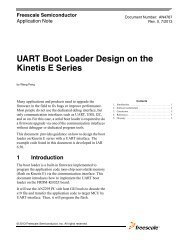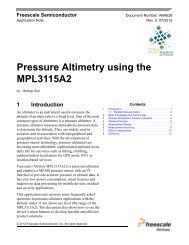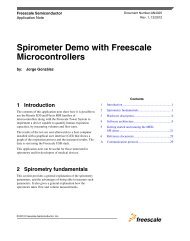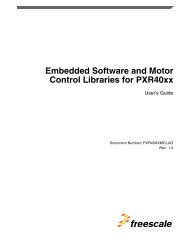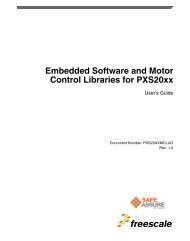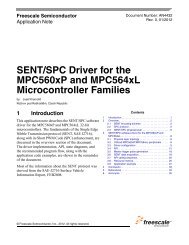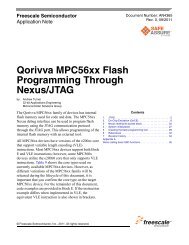MPC5642A - Freescale Semiconductor
MPC5642A - Freescale Semiconductor
MPC5642A - Freescale Semiconductor
You also want an ePaper? Increase the reach of your titles
YUMPU automatically turns print PDFs into web optimized ePapers that Google loves.
Introduction<br />
— Provides temperature of silicon as an analog value<br />
— Read using an internal ADC analog channel<br />
— May be read with either ADC<br />
• 2 decimation filters<br />
— Programmable decimation factor (1 to 16)<br />
— Selectable IIR or FIR filter<br />
— Up to 4th order IIR or 8th order FIR<br />
— Programmable coefficients<br />
— Saturated or non-saturated modes<br />
— Programmable Rounding (Convergent; Two’s Complement; Truncated)<br />
— Prefill mode to precondition the filter before the sample window opens<br />
— Supports Multiple Cascading Decimation Filters to implement more complex filter designs<br />
— Optional Absolute Integrators on the output of Decimation Filters<br />
• Full duplex synchronous serial interface (SSI) to an external device<br />
— Free-running clock for use by an external device<br />
— Supports a 26-bit message length<br />
• Priority based queues<br />
— Supports 6 queues with fixed priority. When commands of distinct queues are bound for the same ADC, the higher<br />
priority queue is always served first<br />
— Queue_0 can bypass all prioritization, buffering and abort current conversions to start a Queue_0 conversion a<br />
deterministic time after the queue trigger<br />
— Supports software and hardware trigger modes to arm a particular queue<br />
— Generates interrupt when command coherency is not achieved<br />
• External hardware triggers<br />
— Supports rising edge, falling edge, high level and low level triggers<br />
— Supports configurable digital filter<br />
1.5.15 Deserial serial peripheral interface (DSPI)<br />
The DSPI block provides a synchronous serial interface for communication between the <strong>MPC5642A</strong> MCU and external<br />
devices. The DSPI supports pin count reduction through serialization and deserialization of eTPU and eMIOS channels and<br />
memory-mapped registers. The channels and register content are transmitted using a SPI-like protocol. This SPI-like protocol<br />
is completely configurable for baud rate, polarity and phase, frame length, chip select assertion, etc. Each bit in the frame may<br />
be configured to serialize either eTPU channels, eMIOS channels or GPIO signals. The DSPI can be configured to serialize data<br />
to an external device that implements the Microsecond Bus protocol. There are three identical DSPI blocks on the <strong>MPC5642A</strong><br />
MCU. The DSPI pins support 5 V logic levels or Low Voltage Differential Signalling (LVDS) to improve high speed operation.<br />
DSPI module features include:<br />
• Selectable LVDS pads working at 40 MHz for SOUT and SCK pins for DSPI_B and DSPI_C<br />
• Support for downstream Micro Second Channel (MSC) with Timed Serial Bus (TSB) configuration on DSPI_B and<br />
DSPI_C<br />
• 3 sources of serialized data: eTPU_A, eMIOS output channels, and memory-mapped register in the DSPI<br />
• 4 destinations for deserialized data: eTPU_A and eMIOS input channels, SIU external Interrupt input request,<br />
memory-mapped register in the DSPI<br />
• 32-bit DSI and TSB modes require 32 PCR registers, 32 GPO and GPI registers in the SIU to select either GPIO, eTPU<br />
or eMIOS bits for serialization<br />
• The DSPI module can generate and check parity in a serial frame<br />
<strong>MPC5642A</strong> Microcontroller Data Sheet, Rev. 3.1<br />
18 <strong>Freescale</strong> <strong>Semiconductor</strong>


